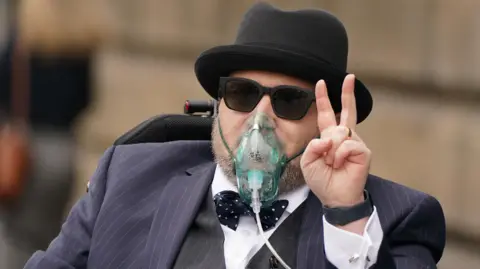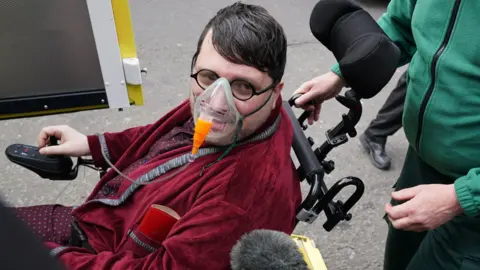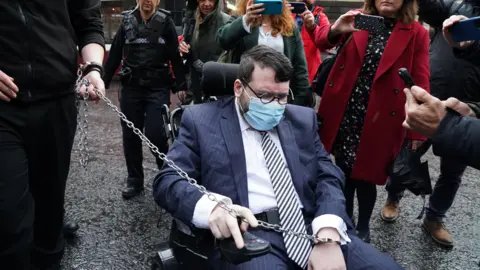Nicholas Rossi: How the mask slipped during US fugitive's court saga
 PA Media
PA MediaI first met Nicholas Rossi - or Arthur Knight, as he insisted on being called - in February 2022 in a corridor at Edinburgh Sheriff Court.
He was there to fight extradition to the US, where he was accused of rape.
Sitting in his electric wheelchair, dressed in a three-piece suit and sporting a wide brimmed hat, the raspy voice behind the oxygen mask was telling anyone who would listen that this was all a terrible misunderstanding.
His hands, meanwhile, were hoovering up reporters' business cards.
Rossi's departure that day set the tone for what became a familiar scene - a slapstick performance in front of the cameras during which he tipped his wheelchair onto the pavement while trying to manoeuvre into a waiting taxi.
Later that evening an unknown number flashed up on my mobile phone and I heard that same raspy voice.
"Hello Steven, it's Arthur… do you have a minute?"
And so began an exercise in separating fact from fiction that continues three years later, which I have explored in a new podcast as part of the Strange But True Crime series on BBC Sounds.
The name Nicholas Rossi first came to wider attention in December 2021 when he was arrested on the Covid ward of a Glasgow hospital.
Staff had recognised his mugshot and distinctive tattoos from an Interpol wanted notice.
The problem for the American authorities was that the man they were seeking to extradite swore blind he was the victim of mistaken identity.
He claimed he was Arthur Knight, an Irish-born orphan who had never been to America - and said he could prove it.
A couple of weeks after our first phone-call, "Arthur" was sitting opposite me in a BBC studio, his wife Miranda by his side, telling his tale for the cameras.
He said he grew up in care in Dublin and escaped to London as a teenager. There, he sold books with his friends at Camden market, like Del Boy from the comedy Only Fools and Horses.
Years later he married Miranda in Bristol before they moved to Glasgow. He showed me their marriage certificate - accompanied by a special licence from the Anglican Church, because "I wouldn't lie to the Archbishop of Canterbury".
What he couldn't produce was a birth certificate. Or a passport.
He was vague about his schooldays and couldn't say what happened to his old friends.
At times the conversation veered as wildly as his accent – from claims he survived the London Tube bombing (he got the date wrong) to a story about once meeting Del Boy's sidekick Rodney.
He repeatedly denied being Nicholas Rossi, but when I asked about tattoos he said he was "too tired" to show me his arms.
It was a surreal, unconvincing performance that was being watched across the Atlantic by plenty of people who recognised the main character.
"I'd know those hands anywhere," Mary Grebinski later told me.
She'd been a college student in 2008 when Nicholas Rossi sexually assaulted her on the way to class. He was convicted and placed on the sex offenders register.
In Dayton, Ohio – the city where that attack happened – I also spoke to Rossi's ex-wife.
Kathryn Heckendorn said she had bought him the red silk pyjamas "Arthur" had been filmed wearing outside court.
Their unhappy marriage lasted eight months. The judge who granted their divorce in 2016 said Rossi was guilty of "gross neglect of duty and cruelty" on account of his abusive behaviour.
Conversations like this helped fill in the blanks.
 PA Media
PA MediaNicholas Rossi was born Nicholas Alahverdian in 1987. Rossi was the name of his stepfather, who at the time was Rhode Island's premiere Engelbert Humperdinck impersonator.
As a teenager he spent time in care and, years later, enjoyed a degree of local fame as a child welfare campaigner.
When reports of Alahverdian's death emerged in 2020, politicians paid tribute from the floor of the Rhode Island State House.
According to an online obituary his last words were: "Fear not and run towards the bliss of the sun."
But it didn't take long for this deception to begin unravelling.
A priest who had been asked to arrange a memorial mass was warned by a detective not to go ahead because "Nicholas isn't dead".
Instead, the authorities suspected Rossi was somewhere in the UK, having fled after discovering that the FBI were investigating an alleged credit card fraud.
 PA Media
PA MediaIt was his online footprint that ultimately led police to his hospital bedside in Glasgow – ironically as the fugitive was recovering from a genuine near-death experience in the shape of Covid.
At one of his early extradition hearings the sheriff commented that advancing the case shouldn't be "rocket science".
But the legal process dragged on and on – in large part due to Rossi's antics.
There were rambling courtroom monologues, questionable medical episodes and theatrical outbursts which were often directed at his own lawyers as a prelude to sacking them.
Sitting in the public gallery, it was rarely dull. Rossi's claim that a corrupt hospital employee called Patrick tattooed him while he was in a coma was one of the more memorable exchanges.
In the end the sheriff's conclusion was that the Arthur Knight charade was "implausible" and "fanciful".
And yet Rossi stuck to his story – even as his extradition was approved and High Court judges refused his appeal.
He stuck to his story as US Marshals bundled him onto a private jet and as prison guards booked him into the Utah County jail.
He stuck to his story in a Utah courtroom, until suddenly he didn't.
In October last year I tuned in to a routine bail hearing online when, without warning, the posh English persona disappeared.
Speaking in a clear American accent he told the judge he was born Nicholas Alahverdian before his name changed to Rossi.
As he claimed to have hidden his identity to escape "death threats", I found myself wondering why he'd chosen that specific moment for the mask to slip.
The saga continues, but the novelty has worn off.
The intrigue and farce has been stripped away while the serious allegations remain.
In August, Nicholas Rossi is due to face the first of two separate rape trials. He denies all the charges.
